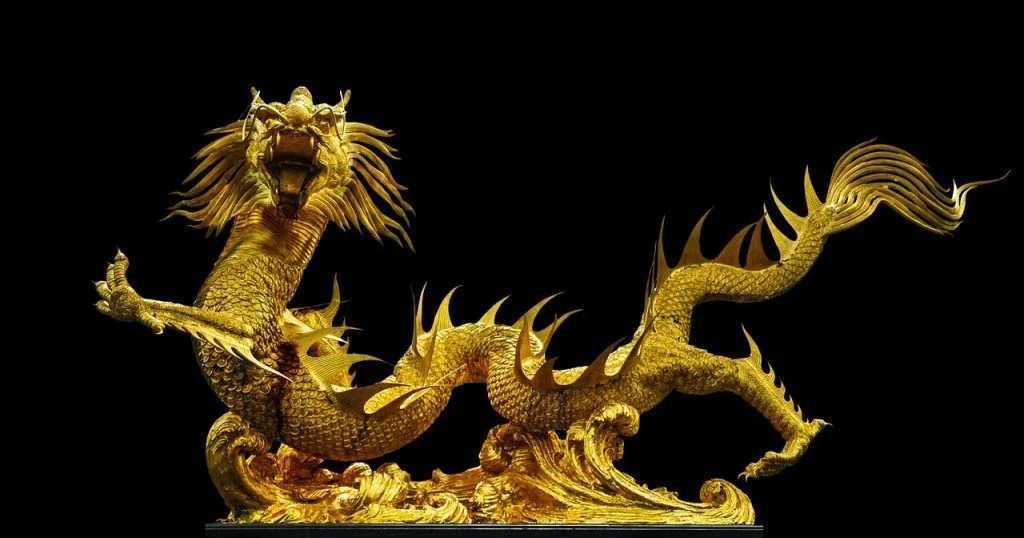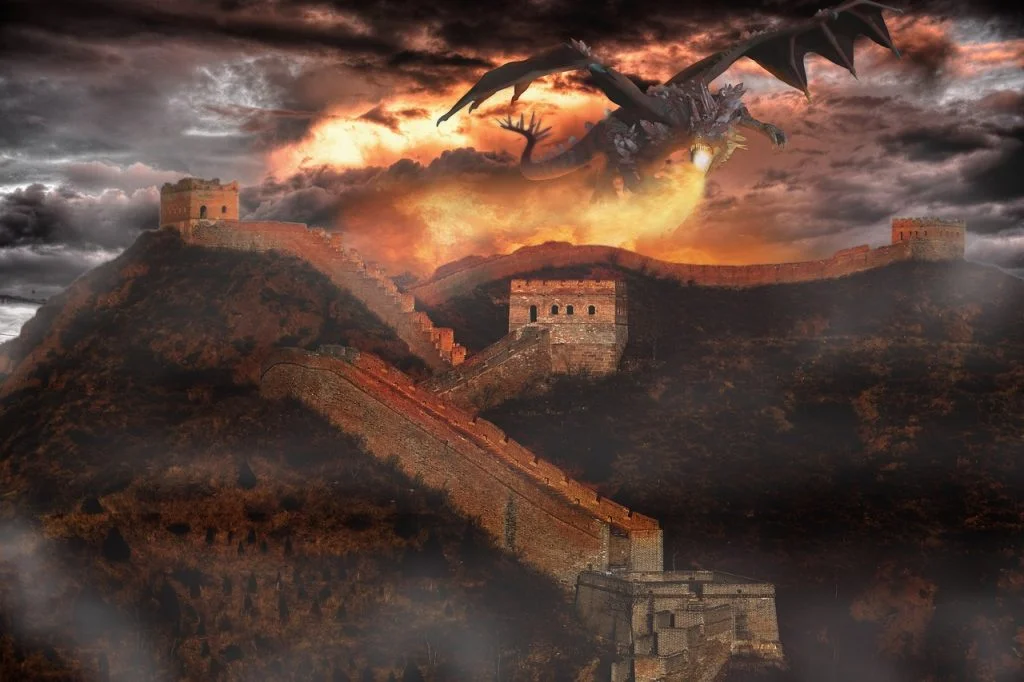Dragons have long fascinated us, appearing in folklore and legends across the world. But what do we really know about these mythical beasts? We’re about to embark on an educational adventure that will explore the rich tapestry of dragon lore.
From the differences in dragon mythology across cultures to the surprising truths behind their legendary powers, this journey promises to enlighten and entertain. So, whether you’re a dragon enthusiast or a curious explorer, prepare to be amazed by the intriguing world of dragons!
Fairy tales do not tell children the dragons exist. Children already know that dragons exist. Fairy tales tell children the dragons can be killed.
G.K. Chesterton
Dragon Facts
Let’s unravel some of the most intriguing facts about dragons. Remember, a challenging quiz awaits at the end of this article, so read each detail carefully to prove your expertise in the world of these creatures. Let’s dive into the flames of knowledge.
- Dragons are legendary creatures found in folklore and mythology around the world.
- In European mythology, dragons are often depicted as fire-breathing, winged beasts.
- Chinese dragons, unlike their European counterparts, are traditionally seen as benevolent and wise.
- Dragons in Norse mythology, such as Jörmungandr, are often associated with the sea and the end of the world.
- The word “dragon” comes from the Greek word drakōn, meaning “serpent” or “giant sea fish.”
- In many cultures, dragons are thought to control water elements, like rain and floods.
- The Welsh flag features a red dragon, a symbol of strength and power.
- Dragons are often depicted as guardians of treasures in myths and legends.
- Eastern dragons are usually portrayed without wings but can fly due to their magical abilities.
- In medieval Christian symbolism, dragons were often seen as representations of sin and paganism.
- The Hydra, a serpent-like creature from Greek mythology, is often considered a type of dragon.
- Some cultures depict dragons as shape-shifters, capable of taking on human form.
- In J.R.R. Tolkien’s Middle-earth, dragons like Smaug are intelligent and can speak.

- Dragon dances are a traditional part of Chinese New Year celebrations.
- Dragons in Slavic folklore are often defeated by heroes or knights.
- Dragon blood is often depicted as having magical properties in folklore.
- In some Asian cultures, dragons are thought to bring good luck and prosperity.
- The Aztec god Quetzalcoatl is often depicted as a feathered serpent, a dragon-like creature.
- Dragons are commonly used as symbols in heraldry and coats of arms.
- In Japanese folklore, dragons are usually water deities associated with rainfall and bodies of water.
- Beowulf, an Old English epic poem, features a battle with a dragon.
- Dragons in Indonesian mythology are often associated with the island of Komodo, home to the Komodo dragon.
- St. George is a Christian saint famously depicted slaying a dragon.
- In some mythologies, dragons are capable of speaking human languages.
- Dragons are a popular subject in fantasy literature and role-playing games.
- The Dragon Boat Festival in China is associated with the legend of a poet saved by dragons.
- Feng shui, a traditional Chinese practice, sometimes incorporates dragon symbolism for auspiciousness.
- Dragons are sometimes depicted as omnipotent beings in mythology.

- In some myths, dragons have the power to control time or weather.
- The Loch Ness Monster in Scotland is sometimes considered a type of water dragon.
- Dragons in Cambodian mythology are protectors of the kingdom and symbols of power.
- In Greek mythology, dragons often guard sacred sites or divine treasures.
- Ladon, a dragon in Greek mythology, guarded the golden apples in the Garden of the Hesperides.
- Some Alchemical texts use dragons as symbols for the primal forces of nature.
- Dragons in Buddhist mythology are often seen as protectors of the Dharma.
- In Armenian folklore, dragons symbolize destruction and evil.
- Vietnamese dragons are symbols of life, existence, and growth.
- Dragon myths often involve the creature being slain as a test of heroism or virtue.

- In Mesoamerican cultures, dragon-like creatures often symbolized the earth and fertility.
- Fafnir, in Norse mythology, was a dwarf who turned into a dragon.
- Dragons in modern fantasy are often depicted as highly intelligent and capable of magic.
- Some Tibetan legends feature dragons as symbols of power and spiritual insight.
- In the Harry Potter series, dragons are magical creatures used at various plot points.
- Mongolian dragons are traditionally believed to live in water or rain clouds.
- Dragons in Polynesian mythology are often associated with creation and the underworld.
- Zmey Gorynych is a famous dragon from Slavic mythology with three heads.
- Dragon bones in ancient China were often thought to be from real dragons but were actually dinosaur fossils.
- In Basque mythology, the dragon-like creature Herensuge is a prominent figure.
- Dragon symbolism is often associated with power, wisdom, and longevity.
- Dragon constellation, also known as Draco, is a constellation in the northern sky.
Dragon Myths

We are leaving behind these fun facts about dragons to continue in the myths section. Let’s discover the actual truth behind these common myths about dragons.
- Dragons Breathe Fire
While the image of a dragon breathing fire is iconic in folklore, in reality, if dragons existed, they would not have this ability. The concept of fire-breathing is likely a symbolic representation of their power and ferocity. - Dragons Hoard Treasure
The popular notion of dragons guarding vast hoards of gold and jewels is a metaphorical tale. If dragons were real, their behavior would more likely align with that of large predators, not treasure collectors. - Dragons are Always Malevolent
Dragons are often depicted as evil creatures in myths, but in some cultures, they are revered as symbols of wisdom and strength. If dragons were real, their temperament would vary as much as any other species. - Dragons Can Fly and Have Magical Powers
Dragons are often shown with wings and magical abilities. However, in a realistic scenario, such large creatures would likely be grounded, and any extraordinary abilities would be more in line with natural phenomena than magic. - Dragons Are Gigantic, Serpentine Monsters
While traditional depictions show dragons as enormous, serpentine beasts, in a realistic sense, their size and shape would be subject to evolutionary and environmental factors, making them potentially smaller and less fantastical in appearance.
No products found.
Dragon Quotes

Here is a list of my favorite quotes about dragons. Feel free to send me more in the comments so I can add them to the list.
Do not meddle in the affairs of dragons, for you are crunchy and taste good with ketchup.
Unknown
This humorous quote plays on the idea of how formidable and dangerous dragons are, suggesting that humans are nothing more than a snack for them.
It does not do to leave a live dragon out of your calculations, if you live near one.
J.R.R. Tolkien
From Tolkien’s rich world of Middle-earth, this quote emphasizes the importance of considering all potential dangers and challenges in one’s plans, especially when they are as significant as a dragon.
The dragon is a creature of great and ancient wisdom, full of knowledge and power.
Unknown
This quote captures the traditional view of dragons in many cultures as beings of immense wisdom and magical power.
Always speak politely to an enraged dragon.
Steven Brust
Brust’s quote, infused with humor, advises on the importance of diplomacy and respect, even in the face of great danger, like an enraged dragon.
The greatest thing you’ll ever learn is just to love and be loved in return. – Nature Boy.
Eden Ahbez
While not directly about dragons, this quote from Eden Ahbez’s song “Nature Boy” captures a profound truth about love and acceptance, qualities that can be metaphorically represented by taming a metaphorical dragon within us.
Dragon FAQ

Have the dragon quotes ignited your curiosity? Great! But before you face the quiz, let’s dive into the FAQ section. Pay close attention, as it’s crucial for what’s coming next.
- Are dragons real?
Ah, the age-old question! While dragons, as the large, fire-breathing creatures of legend, don’t exist in the real world, they’ve been a captivating part of human folklore and mythology for centuries. Across different cultures, dragons have various appearances and attributes, but no physical evidence has ever been found to prove their existence outside of stories and art. - Can dragons shapeshift?
In many tales and legends, dragons do have the magical ability to shapeshift, especially in Eastern mythology. For example, in Chinese folklore, dragons are often depicted as being able to transform into humans or other creatures. This ability adds to their mystique and demonstrates their power in folklore. - How do dragons breathe fire?
Fire-breathing is one of the most famous traits of dragons in mythology. While there’s no scientific basis for any living creature to breathe fire, various myths explain it differently. Some say dragons produce fire in a special organ within their bodies, much like how some beetles produce chemicals for defense. - Are dragons mentioned in the Bible?
Yes, dragons are mentioned in the Bible, but not in the way we think of them in modern fantasy. The term “dragon” in the Bible is often used symbolically or as a translation of Hebrew words like “tannin,” which can mean serpent or sea monster. It’s important to understand the context and the symbolic nature of these references. - Where do dragons live?
In mythology, dragons are said to live in varied places: deep caves, remote mountains, beneath the sea, or even in mystical realms. Their habitats often reflect their mysterious and powerful nature, places unreachable or undiscovered by humans.
No products found.
Dragon Quiz

Welcome to the Ultimate Dragon Quiz! Remember, if you don’t get at least one question right, you might find your socks mysteriously replaced by dragon scales tomorrow morning!
Conclusion
As we close this mythical journey through the world of dragons, it’s hard not to marvel at the rich tapestry of lore and legend these magnificent creatures have inspired. From fiery breath to treasure hoards, dragons have captured our imaginations and hearts.
What is it about dragons that fascinates you the most? Is it their power, mystery, or the endless stories that surround them? Let me know in the comments.
10 Sources Used For This ArticleThe Truth About Dragons – Medium
What Does Dragons Symbolize? – EdenBenGals
Dragon – Crypto Zoology
History Of Dragons – All about Fairies
Norse Mythology – A Complete Overview
Dragon – New World Encyclopedia
Dragon Symbolism & Meaning – Woot And Hammy
Dragons: East versus West – The Artifice
Dragons And Dragon Kings In Ancient Mythology – Ancient Pages


